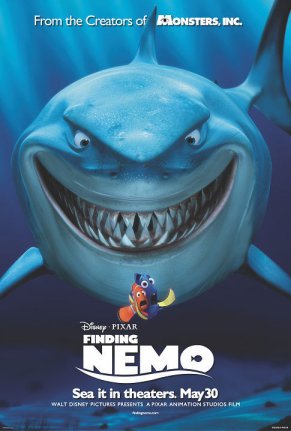| Finding Nemo
Disney: Get a clue. The reason
computer animation has done so well in the marketplace has
little to do with the animation. It's the story. Despite what
the mainstream press would have you believe, bad CG films
tank, too. (Let us remember Final Fantasy, and forget
my initial reaction to it -- 'twas lame no matter what dimension
you put it in, and sank an animation division faster than
you can say Treasure
Planet.)
So yes, you're going to do gangbuster
business with Pixar's Finding Nemo. But not because
we the public love fish that look oddly rubbery. No, this
latest effort from John Lasseter's usual gang of idiots (a
pejorative nod to Mad) will strike a chord because
it is an interesting play on a theme that everyone can identify
with: the parent/child relationship.
Finding Nemo is also
the darkest film from Pixar yet. Though the studio has flirted
with vaguely challenging themes before (Woody's thinly disguised
facing of mortality in Toy Story 2, this film tackles
them head on, and parents should beware that little ones
may get upset at points.
But that's a good thing, because
like Walt Disney himself, the directors (Andrew Stanton
and Lee Unkrich) and their mentor (Lassetter) are simply
showing respect for their audience. Life in and out of the
sea isn't all songs and dances, and pretty things can still
hide danger. Pixar won't pretend otherwise. But they can
still make it fun.
Albert Brooks voices Marlin,
a clownfish overprotective of his only son, Nemo (Alexander
Gould). The film opens with Marlin in happier days, an expectant
parent with his wife Coral (Elizabeth Perkins). Happy to
have moved into a prime piece of anemone real estate, the
fish dream of the future with their hundreds of unhatched
children.
That dream meets a violent
end as a barracuda invades the neighborhood, feasting on
the family (offscreen) until all that are left are Marlin
and one last cracked egg. In honor of Coral, Marlin names
the egg Nemo rather than Marlin, Jr., and takes the vow
that every new father does: "I promise I'll never let anything
happen to you."
Most of us say those words
but understand that a lot of that power is beyond us. Not
Marlin. He means it, and by the time Nemo is ready for school,
the boy chafes under his father's love.
And yet, Marlin's fears are
understandable. The crack in the egg caused Nemo to have
an underdeveloped fin ("his lucky fin"), and the young fish
may be a little too daring in order to compensate. But when
he defies his father and swims into "The Deep," disaster
strikes.
Captured by a human diver,
Nemo soon finds himself in a dentist's aquarium in Sydney,
Australia. Worse, though, he has a date with destiny as
a gift for the dentist's niece - a nightmarish looking little
girl who has a tendency to kill fish within minutes of receiving
them.
Ignorant of his son's plight
but determined to rescue him, Marlin overcomes his own fears
in order to follow that diver.
Of course, the two fish grow
stronger in their independent journeys, and discover how
much they need each other, too. But it's not the tale, it's
the telling, and Pixar does a great job with it.
Finding Nemo isn't
as funny as their earlier efforts, but then again, this
is a more mature work. There are still laughs. For the most
part they're natural, coming gently out of the situations
at hand. Only the surfer dude turtles seem a bit of a stretch.
Even when funny, a lot of
characters are just being true to themselves. Finding
Nemo offers the best translation of seagull thought
ever committed to film. (Not a huge category, but still…)
And though Bruce the Shark (Barry Humphries) wants to swear
off being a carnivore, a little blood in the water quickly
changes him from clown to killer.
This film has poignance, a
lot of which comes from the vocal performances. Brooks'
typical uptight tone doesn't make for the most cuddly of
leading characters, but it absolutely fits a father trying
to hold on so tight that of course he's going to lose his
son. Even Ellen DeGeneres as Dory, though meant largely
as comic relief, has some surprisingly touching moments
as she struggles to overcome her short-term memory handicap.
If Finding Nemo has
a weakness, it's one that plagues a lot of movies lately.
A few sequences are too easily and obviously translatable
into a videogame; I checked the box at Best Buy a few days
ago to confirm it. Though visually exciting, such scenes
interrupt the flow. The climax of the film plays out much
more organically and sensibly without losing any power.
Forget about the toys you
can buy and the games you can play. Finding Nemo
stands on its own as a good animated film. Ink and paint
could certainly still rival it in beauty; we just need to
get some good storytellers working in 2D again.
What's It Worth? $8.50
|







